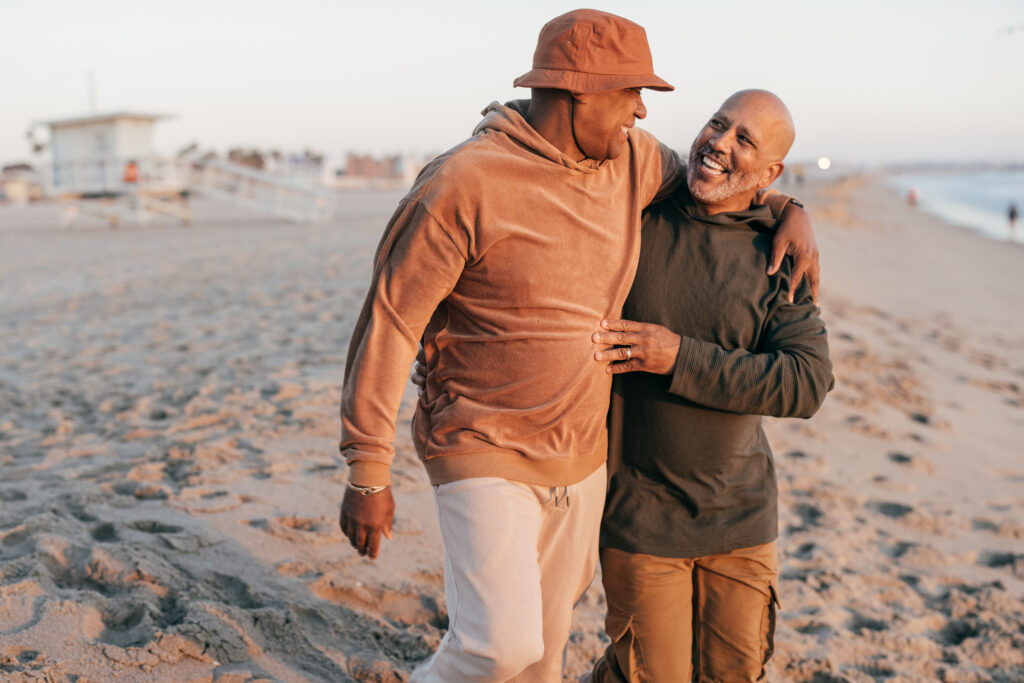Right now, things feel particularly dark in the world. We are facing political instability, extreme loss of human rights and of human life on a global level, and increased attacks on queer rights.
Many of us want to be informed and at the same time feel overwhelmed. It seems to have come to the point that zoning out—or numbing out completely—are the only options. However, that often leaves us all disengaging more and more from our own feelings and our lives.
The thing is: as human beings we need to feel our feelings. We need to be able to express our fears, just as it’s important to express our joy and feel like we belong. The problem is that all our emotions come from the same spout so to speak. That means if we turn off the spout to stop the fear and sadness, then we also turn off the joy too.
This is where compassionate engagement comes in. It’s the willingness to turn towards and recognize our own suffering and that of others as part of what we experience as human beings. However, that in itself might be scary—to say, “I’m having a hard time right now.” We also might have a hard time with this depending on our attachment style, if we experience depression, anxiety, and are highly self-critical, according to a 2022 study. These conditions lessen our stress tolerance, and we’re more likely to have compassion fatigue, meaning we can’t show up or witness the suffering of others, including our loved ones.
Several studies have shown that we can actually expand our capacity for tolerating difficult emotions if we meet ourselves with increased self-compassion and take steps to explore what might alleviate our suffering (known as compassionate action).
Studies also show that self-compassion positively affects our health: when we’re more kind to ourselves, we experience more positive emotions. The feelings of warmth expressed as a result releases oxytocin which reduces inflammation in the cardiovascular system.
Self-compassion is literally the opposite of internalized shame language and is linked to strengthening of our vagal tone, as identified in a 2015 study, which is an overall marker of “good health.”
Our vagus nerve innervates with almost every organ in our body, and it’s responsible for taking in all the data from our outside environment (Am I safe? Do I need to take action?) and adjusts our body’s internal responses. Strengthening vagal tone has shown to lower blood pressure, lessen symptoms of anxiety and depression and increase prosocial feelings and behaviors that promote feelings of belonging. It’s a direct link between how we experience our inner world and how we respond and interact in our outer environment—Including how well we’re able to show up for others in our lives.
What I often see with my health coaching clients, and with others around me in my personal communities, is a willingness to be more helpful and compassionate towards others than we are towards ourselves…especially us queer folk! Many of us already deal with varying degrees of internalized shame, which has a negative impact on our health behaviors and overall wellbeing.
The good news is that we can use small daily habits to practice taking compassionate action. There are four that I’ve seen make a massive impact on the experiences and health of my clients.
1) Start the day with a breathing practice. It can be more structured like boxed breathing (Breathe in. Hold. Release), or you can just focus on your inbreath/ outbreath for 3-5 minutes, that’s it.
2) Finding flow. Create space each week for things that bring you joy like hobbies, time in nature, play.
3) Listening to what you want. Take time each week to journal, create a vision for yourself in your life, decide what things are going to be just for you.
4) Focusing on bright spots/wins. This is what I call the evidence that’s already in your life of what’s going well. So often we only focus on what we think we need to “fix,” where we messed up, or what’s wrong with the world, when there are so many positive things happening every day right alongside the negative. So, practice widening the focus to include, and pay specific attention to, what you’re doing well!
The only real power we have in the world starts with understanding how to grow our own power and light, and then we can more readily share that with others without feeling like we’re getting burnt out or overwhelmed. As the adage of one flame lighting a thousand lights suggests, we can fully step into our own lives with self-compassion, because we deserve that too. It’s not just for other people, and we can actually hold both the darkness and the light.
If you feel like you need some support around your health and wellbeing, check out www.habitqueer.com. I’m here to help.
–Meghan Crutchley









More Stories
Thin…But at What Cost? The craze for weight-loss drugs and the LGBQT+ community
Seasonal Impacts on Mental Health
Putting a Ring on It